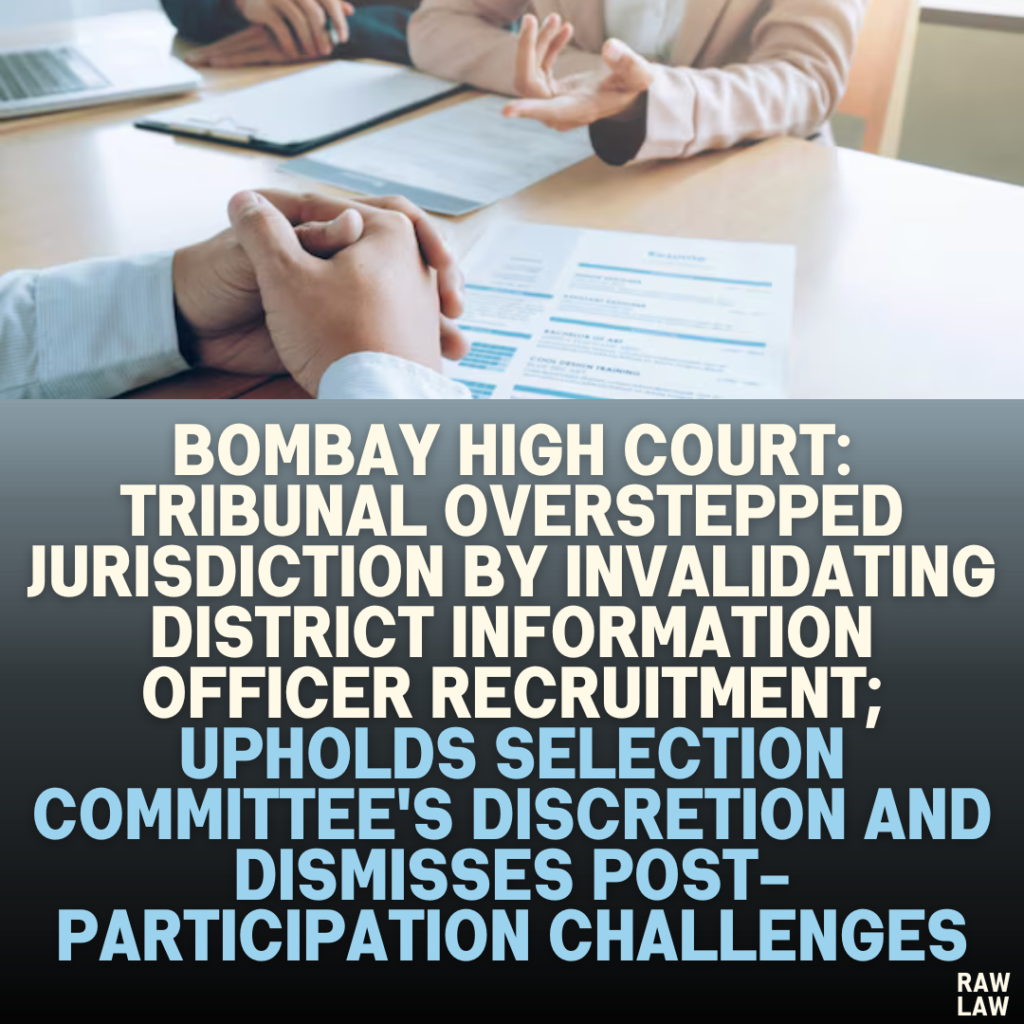1. Court’s Decision:
The Bombay High Court overturned the Maharashtra Administrative Tribunal’s (MAT) judgment, which had invalidated the recruitment process for District Information Officers (DIO) and directed a fresh recruitment exercise. The High Court held that the Tribunal had exceeded its jurisdiction by:
- Revisiting decisions of the Selection Committee.
- Expanding the scope of pleadings beyond what was raised by the aggrieved candidate.
- Entertaining challenges to recruitment reservations after the aggrieved candidate had participated in the process without initially raising objections.
The Court emphasized that judicial interference in administrative matters must be limited to procedural legality rather than substituting the authority’s discretion.
2. Facts of the Case:
- Recruitment Advertisement:
- On February 11, 2008, an advertisement was issued for eight posts of DIO under the Maharashtra Public Relations Department.
- Out of the eight posts, reservations were allocated as follows:
- 1 for Scheduled Castes.
- 3 for Other Backward Classes.
- 4 for Open Category, with sub-reservations:
- 3 for women.
- 1 for sportspersons.
- Aggrieved Candidate:
- The candidate, aged 37 years and 5 months, exceeded the maximum age limit of 35 years for general applicants not in government service.
- Although Rule 7 of the Recruitment Rules allowed age relaxation for candidates with “exceptional qualifications or experience,” no recommendation was made by the Selection Committee for the aggrieved candidate.
- Legal Challenge:
- The aggrieved candidate was initially barred from the written examination. Following interim relief from the High Court, he was allowed to appear but did not secure further consideration due to his age.
- He later challenged the entire selection process before the Tribunal, citing procedural violations, excessive reservations, and wrongful rejection of his candidature.
- Tribunal’s Judgment:
- The MAT quashed the recruitment process, citing:
- Breach of reservation policies (excessive sub-reservations for women).
- Non-verification of Non-Creamy Layer Certificates.
- Procedural flaws in denying age relaxation.
- It directed a fresh recruitment process and reconsideration of the aggrieved candidate’s application.
- The MAT quashed the recruitment process, citing:
3. Issues:
- Did the Tribunal exceed its jurisdiction by questioning the competence of the Selection Committee and expanding the pleadings?
- Was the age relaxation for the aggrieved candidate wrongly denied?
- Were the sub-reservations for women and sportspersons in violation of the Recruitment Rules?
- Could the aggrieved candidate, after participating in the selection process, validly challenge its legality?
4. Petitioners’ Arguments:
The successful candidates and the State of Maharashtra argued:
- Jurisdictional Overreach by the Tribunal:
- The Tribunal substituted its judgment for that of the competent Selection Committee without demonstrating arbitrariness or illegality in its decision-making.
- Limited Role of the Selection Committee:
- The Selection Committee was not empowered to grant age relaxation; this authority rested with the appointing authority.
- Challenge After Participation:
- The aggrieved candidate, after participating in the process, was barred from later challenging its legality.
- Sub-reservations:
- Reservations for women and sportspersons were explicitly stated in the advertisement, and no objections were raised initially.
5. Respondent’s (Aggrieved Candidate) Arguments:
- The aggrieved candidate argued:
- Improper Denial of Age Relaxation:
- His qualifications and experience (editorial roles in media) were exceptional and deserved consideration.
- Violation of Reservation Rules:
- Horizontal reservations for women exceeded the permissible limit of 30%.
- Non-Creamy Layer Certificates:
- The certificates of other candidates were not properly verified, affecting the fairness of the selection process.
- Improper Denial of Age Relaxation:
6. Analysis of the Law:
- Age Relaxation (Rule 7):
- Under the Recruitment Rules, age relaxation required a recommendation from the Selection Committee based on exceptional qualifications or experience.
- The Selection Committee reviewed 24 over-aged applicants, including the aggrieved candidate, and found none eligible for relaxation.
- The Tribunal improperly questioned the Selection Committee’s discretion without finding it arbitrary or perverse.
- Reservation Challenges:
- Sub-reservations (three posts for women and one for sportspersons) were explicitly mentioned in the advertisement.
- By participating in the recruitment process, the aggrieved candidate waived his right to later challenge these reservations.
- Tribunal’s Jurisdiction:
- The Tribunal acted beyond its jurisdiction by:
- Evaluating comparative qualifications of candidates.
- Expanding the scope of pleadings beyond what was raised.
- The Tribunal acted beyond its jurisdiction by:
7. Precedent Analysis:
- Sonali Ramkrishna Bayani v. State of Maharashtra: A candidate cannot challenge recruitment criteria after participating and failing in the process.
- Renu v. District & Sessions Judge: The Tribunal incorrectly relied on this case’s principles of quo warranto, which did not apply to disputes over age relaxation or recruitment procedural errors.
8. Court’s Reasoning:
- Exceeding Pleadings:
- The Tribunal improperly expanded the aggrieved candidate’s case to challenge the competence of the Selection Committee, despite no such argument being raised.
- Procedural Impropriety:
- The Tribunal substituted its judgment for the Selection Committee’s evaluation of qualifications, a jurisdictional overreach.
- Reservations:
- The aggrieved candidate failed to challenge reservations before participating in the recruitment, barring him from subsequent objections.
- Quo Warranto Misapplication:
- The Tribunal erroneously treated the case as a quo warranto proceeding, which was inapplicable.
9. Conclusion:
The High Court quashed the Tribunal’s judgment, dismissing the aggrieved candidate’s claims. It upheld the original recruitment process, ruling that:
- Judicial intervention in administrative decisions must be limited to cases of clear procedural illegality.
- Candidates cannot challenge recruitment conditions after participation without prior objections.
10. Implications:
- Limits on Judicial Review:
- Courts and tribunals must respect the discretion of administrative authorities unless decisions are arbitrary or illegal.
- Timeliness in Objections:
- Challenges to recruitment advertisements or criteria must be raised promptly before participating in the process.
- Clarity in Age Relaxation Policies:
- Clear guidelines are needed for exceptional cases to avoid disputes.
